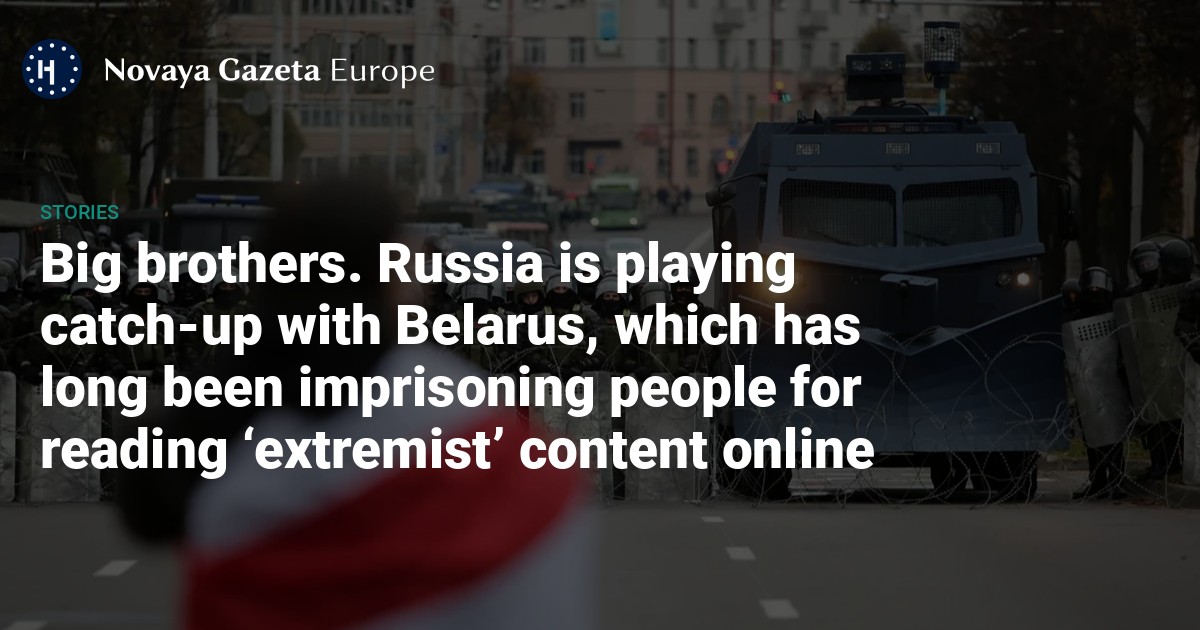



On 16 July, a Telegram channel run by a key agency responsible for political persecution in Belarus posted a joyous message: “News from our brothers in Russia — there will be fines for searching for and publishing prohibited materials using a VPN”, celebrating Russia finally catching up with repressive legislation that Belarus has enacted for years.
Belarus’s misnamed Directorate for Combating Organised Crime and Corruption, or HUBAZiK, nicknamed the Belarusian Gestapo, runs a special Telegram channel that calls on Belarusians to inform on their neighbours and colleagues and posts regular updates to the list of materials and groups the Belarusian authorities have deemed “extremist”.
“Have you seen someone watching extremist channels and videos on the metro? Get in touch!” says a video ad posted on the channel, which also hosts mea culpa videos of Belarusians detained for accessing banned content.
On Tuesday, the State Duma, Russia’s lower house of parliament, passed a controversial bill introducing fines for looking up “extremist” content online and for using virtual private networks (VPNs) to access that content.
The bill, which is expected to be rubber-stamped by the Senate and signed into law by Vladimir Putin in the coming weeks, echoes legislation that has been used to suppress dissent in Belarus for over a decade, with citizens facing fines or administrative arrests for distribution, manufacture, or storage of information “calling for extremist activity or promoting such activity”.
In the five years since the mass protests of 2020, an administrative arrest has all too often been the first step towards criminal prosecution.
The offence existed long before the protests of 2020, when Belarusians came out onto the streets in record numbers to protest yet another stolen presidential election, and the regime’s reaction to them.
It first appeared as an administrative offence in 2010, when most Belarusians didn’t yet have smartphones. Not everyone yet had a social media profile and popular messenger apps like Telegram didn’t even exist. But even then you could be fined or imprisoned for 15 days for possession of the wrong newspapers, leaflets, or website printouts. In the five years since the mass protests of 2020, an administrative arrest has all too often been the first step towards criminal prosecution.
Yekaterina Yanshina, a Russian journalist who found herself imprisoned for 15 days at the notorious Akrestsina detention centre in Minsk in 2023 while covering a trial of Belarusian human rights defenders, told Novaya Europe that people serving short administrative sentences often feared additional charges would be pressed against them to keep them locked up for longer. This is where Belarus’s “extremist content” legislation came in.
The security forces would carefully, scrupulously study the person’s phone during those 15-day sentences. If they found compromising photos, messages or subscriptions — by their low standards, anything could qualify — then they would have the time to drum up charges and request the person be detained as a suspect.

Protesters attend a rally against the results of the presidential elections, in Minsk, Belarus, 30 August 2020. Photo: EPA/STRINGER
However, even if the “suspect” wasn’t transferred to pretrial detention, there were other ways they could have their temporary custody extended.
In 2021, the husband and wife team of Siarhei Krupenich and Anastasia Krupenich-Kandratsiyeva broke all records for administrative detention. The couple had forwarded messages from different media to each other, and were charged separately for each one — some nine times in all.
They served 127 days behind bars in total from July 2021 to November 2021. When they were released, exhausted — prisoners may not receive parcels from outside while in detention and the beds have no mattresses — the Krupeniches left Belarus. Four months behind bars for misdemeanours was just the police deciding what to do with them.
Belarusian authorities also differentiate between storing or accessing “extremist materials”, which is an administrative offence, and subscribing or donating to media outlets branded “an extremist group”, a much more serious charge. In many cases, the more serious charge follows the initial short arrest.
Vigilance is powerless against the state’s paranoia.
Iryna Slaunikava was one of the few independent journalists in Belarus not to have been imprisoned by the fall of 2021. That October, she went on holiday to Egypt with her husband. They were both detained at Minsk Airport on their way back into the country for 15 days for allegedly storing “extremist” material on their phones.
Slaunikava’s husband was released after 15 days, while she had another 15 days added for “petty hooliganism”. After her second stint of administrative arrest, she was transferred to pretrial detention and accused of setting up an “extremist group”. The extremist group they had in mind was the opposition Belsat TV channel where Slaunikava worked. She was sentenced to five years in prison.
Belarusians now observe unwritten rules for their own safety. They wipe their phones before crossing the border, some before leaving the house. They use two phones — the unsafe one, left at home in a secure place, and a second one they carry around with them with subscriptions to travel channels and innocuous pictures of cats. When you can’t stop people looking over your shoulder, such as on public transport, you look at nothing more suspicious than the weather forecast and event listings.
But even that won’t always help. Vigilance is powerless against the state’s paranoia.
The Russian government has banned independent media. We were forced to leave our country in order to keep doing our job, telling our readers about what is going on Russia, Ukraine and Europe.
We will continue fighting against warfare and dictatorship. We believe that freedom of speech is the most efficient antidote against tyranny. Support us financially to help us fight for peace and freedom.
By clicking the Support button, you agree to the processing of your personal data.
To cancel a regular donation, please write to [email protected]
VPNovaya
Help Russians and Belarusians Access the Truth
